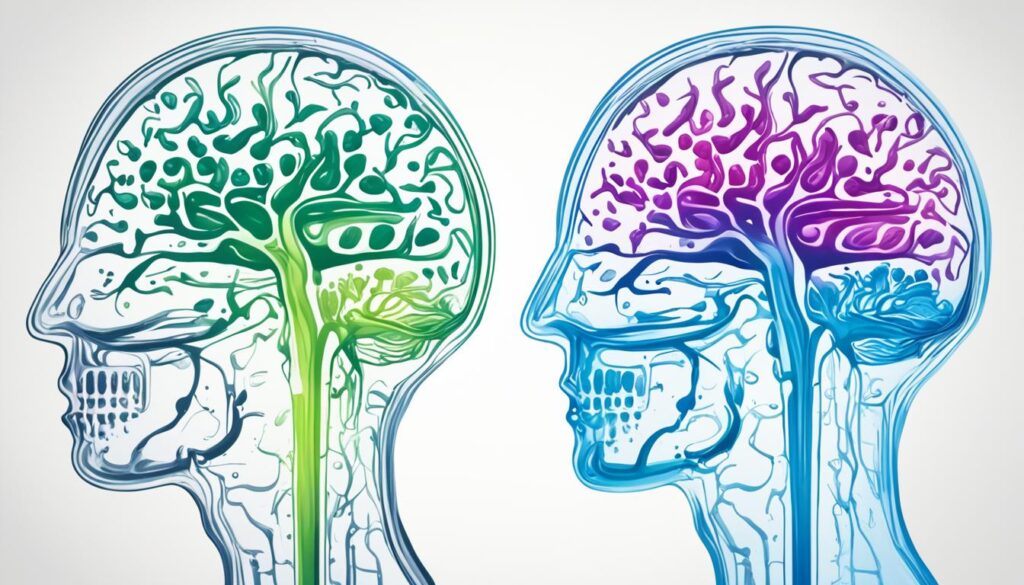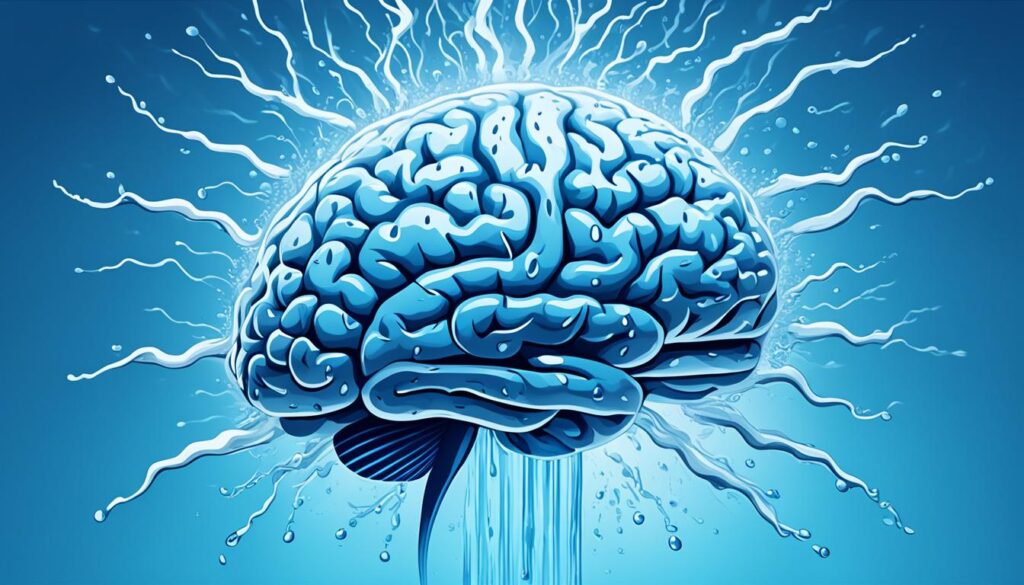The link between staying hydrated and how well we think is always being looked into. Drinking enough water is not just good for our bodies. It helps keep our brain in top condition too. Water does a lot for our well-being. It aids in digestion, makes sure our body’s salts are balanced, and carries nutrients where they’re needed. Keep in mind, most of our weight is water – about 45-75%. So, you can see how vital it is for our health1. We lose water without realizing it, around 450mL a day, affecting how hydrated we are1.
Not drinking enough water can make us sluggish and forgetful. Even losing just a bit of fluid can impact how well our brain works, our memory, what we pay attention to and even our feelings. Our bodies usually let go of about 2550ml of water each day. That makes it very important to drink often to make up for what we lose2. Research confirms that how well we think and feel is tied to how hydrated we are3. Knowing all this can inspire us to be smarter about drinking water.
Key Takeaways
- Water is huge for our bodies, making up 45-75% of our weight1.
- Every day we unknowingly lose about 450mL of water, affecting our hydration1.
- Staying well-hydrated is key for our mind and body3.
- Lacking water, even a little, can mess with our thinking and how we feel3.
- Drinking water regularly is essential to keep up with the 2550ml we lose daily2.
The Importance of Hydration for Brain Health
Staying hydrated is key for keeping our brain both functional and well-structured. The brain is mostly made of water, about 75%. This high water content shows just how important it is to drink enough water every day. It helps with thinking clearly and remembering things easily.
Not drinking enough water can make us feel less sharp, slow down our reactions, and mess with our short-term memory. Shockingly, around 17% of older people don’t drink enough water, leading to these issues. This makes it clear that keeping up with our water intake is vital for staying mentally sharp, especially as we get older.
Hydration and Brain Function: What You Need to Know
Just a little dehydration can mess with how we think and move. It can affect our attention, ability to coordinate our movements, and how well we plan. However, kids who take extra water at school do better when it comes to learning4. Figuring out how much water you need, and when, can also help you keep in shape and do well in sports5.
Eating watery foods like fruits and veggies is another great way to stay hydrated. This simple act can really help boost our brain’s work. So, staying hydrated isn’t just about drinking plain water. It means watching the water we get from what we eat, too.
Essential Nutrients and Cognitive Function
Hydration helps carry important nutrients to our brain cells. This means that by drinking enough water, we’re also fueling our mind. If we don’t drink enough water, we might be more likely to have problems with our nervous system later on. The suggested amount is 2 liters of water each day, at least6.
A good, nutrient-dense diet paired with enough water can really boost brain health. It supports our memory and how well we think overall. This link between drinking water, eating right, and good brain function is vital. So, by understanding how water and nutrients are related, we can look after our brains better45.
To sum up, making sure we drink enough water is crucial for our brain’s wellbeing. It helps with focus, remembering, and just thinking better in general. By being careful about what we eat and how much water we drink, we can really improve how our brain works.
How Dehydration Impacts Cognitive Performance
Dehydration can seriously affect how well our brain works. Even slight dehydration, at 1%-2% levels, can reduce the brain’s performance. This shows how important it is to drink enough water to keep our minds sharp7.

Short-term Memory and Dehydration
Being dehydrated, even just a little, can hurt our short-term memory. We might find it hard to remember what happened recently or what tasks we need to do. A drop of about 2% in our fluid levels can make us less attentive and mess with our short-term memory8. Dehydration at 2.8% can also slow our reaction time and make us less agile8. So, drinking enough water is key to staying mentally alert and on top of things.
Mood Changes and Cognitive Decline
Dehydration not only makes us physically feel bad but can also mess with our mood. It can make us irritable and more anxious, which can lead to a general drop in how well we think9. Studies show that changes in mood can make cognitive problems worse. This might lead to a negative loop where feeling down affects how well we think, which in turn affects our mood9. Keeping hydrated is vital for keeping both our body and mind in a good place.
Hydration and Cognitive Performance: Recent Research Insights
Recent studies show a big link between drinking enough water and our minds. Hydration helps our brain’s cleaning system work well. This is important for getting rid of harmful stuff and may help prevent diseases like Alzheimer’s10.

Evaluating the Effects of Hydration on Learning and Attention
Drinking enough water is key for better learning and focus. If we don’t drink much, even a bit less fluid in our body can hurt how our brain works. This can make it harder to remember things and make good decisions10. Plus, staying well-hydrated means we can focus better on tasks that need a lot of our attention11.
The Role of Water Consumption in Test Performance
People are really looking into the link between drinking water and doing well on tests. Studies say drinking water before a test can help us remember more and stay focused. Since our brain is mostly water, keeping it hydrated is key for thinking well and feeling good. This supports our mood, protects our brain, and helps us do our best during important times11. So, drinking water before exams can really make a difference.
Optimal Hydration Levels for Cognitive Health
Figuring out the best hydration levels for your brain is a big deal in the world of nutrition. It’s key for how well your body and mind work. Experts say adults should drink about 2 liters (8 cups) of water every day. This amount isn’t just good for your body. It boosts your brain too [source].
Drinking enough water improves how well you think. Being dehydrated makes it hard to focus and remember things. For seniors, staying hydrated is even more important. Not drinking enough might lead to thinking and health problems12. So, drinking plenty of water is vital for keeping your mind sharp, no matter your age.
Everyone, from kids to the elderly, needs good hydration to think clearly. Studies say being well-hydrated helps with brain benefits for all ages. This is super important in places like nursing homes. Helping with water needs there can really improve brain health12. For example, having too few electrolytes and not enough water in the body show why good hydration is crucial12.
A UK study focused on the role of staying hydrated in older, less healthy adults. It showed that careful water-drinking can stop thinking problems and keep you well12. These findings tell us just how vital the right water intake is for our brains12.
In the end, knowing and keeping up with the right hydration levels matters. This can happen by knowing how much water you need to drink. It also helps when places like schools and organizations make sure to have enough water around. Doing this can really boost our thinking abilities and make life better.
Hydration Strategies to Enhance Cognitive Function
It’s key to have good hydration strategies to keep your brain sharp. Drink water throughout the day to avoid dehydration. This is crucial for not just athletes but for everyone. Keep an eye on the color and how often you go to the bathroom. This tells you if you’re drinking enough.
Eating foods high in water content helps a lot. Think cucumbers, tomatoes, and watermelon. It keeps your mind clear and your body hydrated. Also, make sure to drink more water when you’re active. Humid weather or if you’re sick means you also need to up your intake. If you lose a lot of weight (2% or more) through sweat, you’ll struggle more with focus and mood13.
Electrolytes are important for your fluids and brain too. Foods like bananas and spinach are great for this. Nuts are good too. Having enough magnesium is a big deal. It can help your brain work better and keep you in a good mood13. If you like drinks that help with electrolytes, try Cadence™ Electrolyte Drink. It’s got good stuff like sodium chloride and magnesium lactate. It’s also good for potassium balance. All this helps with your brain and how you think13.
Telling people why staying hydrated is so important really can help everyone do better. Learning good hydration tips is crucial for thinking well and being healthy. Teaching how to drink more water and check if you’re hydrated enough is great for brain health.
- Regular water intake throughout the day
- Monitoring urine color and frequency
- Consumption of water-rich foods
- Adjusting fluid intake based on activity and environment
- Including electrolyte-rich foods and beverages in the diet
| Strategy | Benefits |
|---|---|
| Regular water intake | Maintains consistent hydration levels |
| Monitoring urine | Helps detect early signs of dehydration |
| Water-rich foods | Additional source of fluid |
| Adjusting intake | Tailors hydration needs to individual conditions |
| Electrolyte-rich foods | Balances electrolytes, enhances cognitive function |
Special Considerations: Hydration in the Elderly and Children
It’s vital for the elderly and children to stay hydrated. The elderly face challenges because they might not feel as thirsty. And their bodies change as they get older. For children, drinking enough is key for brain development and good behavior.
Hydration Needs of the Elderly
Older adults can easily become dehydrated, especially in care facilities or hospitals14. They might not feel as thirsty and their kidneys might not work as well. This makes dehydration a bigger risk as they age14. Nearly 50% of older adults in hospitals have signs of not drinking enough water14.
As people grow older, their total body water decreases. This can be made worse if they take diuretics or laxatives14. These factors combined mean many older adults don’t get enough water. This can harm their brain health at any age.
Checking for dehydration in the elderly is tricky. The usual signs might not show14. And, the difficulty in swallowing, called dysphagia, is common in nursing homes. This makes it even harder to get enough fluids14. Testing their blood for osmolality is often suggested. This test gives a clear picture of their hydration status14.
Dehydration affects both the body and the mind in older adults. It can lower their thinking abilities by up to 7%15. Ensuring they drink enough water is crucial for keeping their brains healthy.
- Many older adults in hospitals do not drink enough water14.
- Their bodies’ changes and kidney function problems make older adults more prone to dehydration14.
- Not drinking enough can lower thinking abilities in the elderly by up to 7%15.
The Impact of Hydration on Children’s Cognitive Abilities
Kids’ thinking abilities are closely linked to how much they drink. Even a little dehydration, if they lose less than 2% of their body weight, can hurt their memory and focus16. If they lose over 2%, their school work can suffer15. So, it’s key to keep kids hydrated for their brains to grow right and learn well.
Surprisingly, about 1 in 3 kids ages 1 to 3 don’t get enough water each day15. They might not drink much water for a few reasons. It could be because they don’t find water tasty or because it’s not always easy to find water16. Fixing these issues can help boost kids’ brain power and mood over time.
- If kids lose more than 2% of their body weight, their thinking can get 10% worse15.
- On average, children ages 1-3 drink 17% less water than they should15.
- Just missing water can make kids less alert and affect their mood16.
Helping children and the elderly drink enough water is crucial for their minds and happiness. Knowing their specific needs and making water easy to find can keep their brains sharp at every stage of life.
Future Directions in Cognitive Performance Research
Future research on cognitive performance should look deeper into how what we eat and drink affects our brain. We now know that activities like running and lifting weights help our brains stay sharp, even as we get older17. Combining these exercises with games or puzzles seems to be even better for keeping our minds agile17. This mix can help improve how our brains work if we start early enough.
Researchers are also keen on studying how drinking and eating affect our brains over time. They’re looking at people who have tough jobs in hot places, like in Taiwan where many deal with very hot working conditions. This work highlights a big connection between thinking skills dropping and stressful environments18. Surprisingly, only the hardest brain tasks seem to take a hit in extreme heat, not the easier ones18. Understanding these effects better can help us know more about the links between staying hydrated, our surroundings, and our brain power.
New tech and teamwork are making it easier to dig into how our brains perform. For example, there are cool new studies using heart monitors for walks that are already good for us. They found that this simple tweak helps with thinking quickly and making decisions in as short as eight weeks17. With such progress, it’s clear that we should focus on using better tech and coming up with smarter ways to drink to boost our brain power. This is key to making solid gains in brain health that help everyone, young and old.
Source Links
- The Hydration Equation: Update on Water Balance and Cognitive Performance
- Levels of Hydration and Cognitive Function
- Effects of Dehydration and Rehydration on Cognitive Performance and Mood among Male College Students in Cangzhou, China: A Self-Controlled Trial
- Effects of hydration status on cognitive performance and mood | British Journal of Nutrition | Cambridge Core
- What is the importance of hydration for brain health? | 5 Answers from Research papers
- Can Hydration Affect Academic Performance? – Key To Study
- (PDF) Cognitive Performance and Dehydration
- The Effects of Dehydration on Physical & Cognitive Performance
- Impact of Preparticipation Hypohydration on Cognitive Performance and Concussion-like Symptoms in Recreational Athletes
- How Hydration Can Boost Your Cognitive Performance
- Water: The Ultimate Brain Booster
- Hydration Status in Older Adults: Current Knowledge and Future Challenges
- The Effects of Hydration on Cognitive Performance
- Narrative Review of Low-Intake Dehydration in Older Adults
- The challenge with hydration for the elderly
- Hydration, mood state and cognitive function
- Is an 8-Week Regimen of Nordic Walking Training Sufficient to Benefit Cognitive Performance in Healthy Older Adults? A Pilot Study
- Frontiers | The Impact of Different Environmental Conditions on Cognitive Function: A Focused Review




